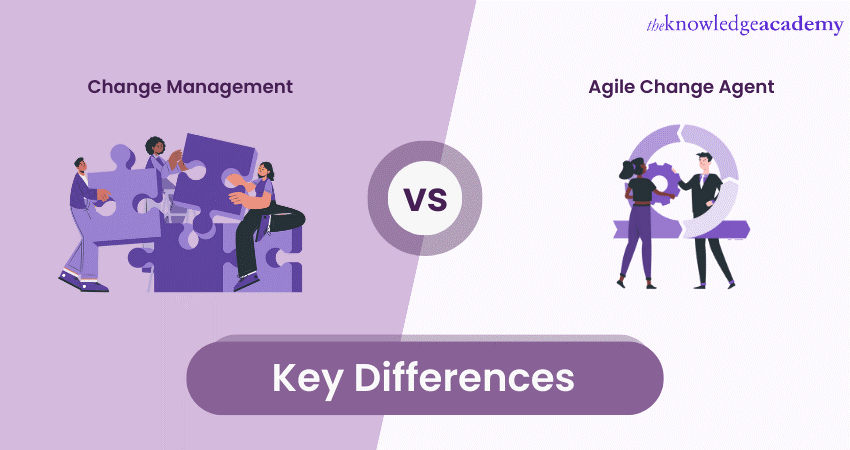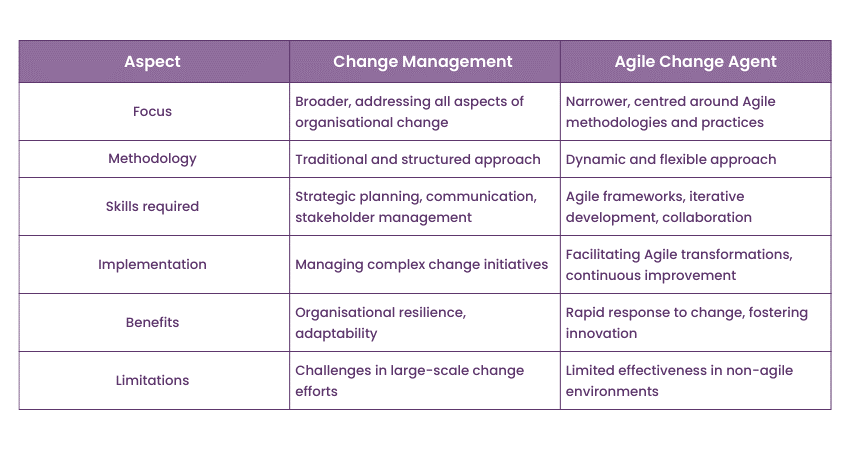We may not have the course you’re looking for. If you enquire or give us a call on 01344203999 and speak to our training experts, we may still be able to help with your training requirements.
Training Outcomes Within Your Budget!
We ensure quality, budget-alignment, and timely delivery by our expert instructors.

Change is one of the most important aspects of any modern organisation's growth and evolution. Companies often seek help from Change Management professionals to navigate the change process. Do you want to learn the differences between Change Management vs Agile Change Agents? You have come to the right place. Read below to learn the differences between the two.
Understanding the distinctions between these methodologies is crucial in choosing the most suited approach for your organisation's specific needs. This blog will provide a detailed comparison of Change Management vs Agile Change Agent methodologies.
Table of Contents
1) Change Management vs Agile Change Agent: What are the differences?
a) Definition and overvie
b) Methodology and approach
c) Focus and scope
d) Skills and competencies
e) Implementation and execution
f) Benefits and advantages
g) Limitations and considerations
2) How to choose the right methodology?
3) Conclusion
Change Management vs Agile Change Agent: What are the differences?
This section of the blog will delve into a detailed comparison between Change Management and Agile Change Agent methodologies.

Enhance your project management skills with our Agile Project Management Foundation & Practitioner (AgilePM®) course. Gain a comprehensive understanding of Agile methodologies and unlock the secrets to successful project delivery.
Definition and overview
Change Management is a structured approach to introducing a change at the workplace and addressing resistance to change through the implementation of a change management plan. It helps keep the employees and other stakeholders satisfied. It involves planning, organising, and implementing change initiatives to minimise resistance and ensure successful adoption. Change Management encompasses various processes, tools, and techniques to support individuals through the change process.
On the other hand, an Agile Change Agent is an individual or a team that facilitates organisational change using Agile Principles and Methodologies. Agile Change Agents focus on iterative and incremental change, emphasising flexibility, collaboration, and continuous improvement. They work closely with cross-functional teams to drive change initiatives adaptively and responsively.
Methodology and approach
Change Management typically follows a traditional and structured approach. It provides a systematic framework for managing change initiatives, including comprehensive planning, stakeholder engagement, and communication strategies.
The Role of the Agile Change Agents, in contrast, is more dynamic and flexible. They embrace iterative development, frequent feedback loops, and adaptability to changing circumstances.
Focus and scope
Change Management has a broader focus, addressing all aspects of organisational change. It delves into strategic, operational, and cultural change and considers the impact on people, processes, and systems.
Agile Change Agents, on the other hand, have a narrower focus, primarily centred around Agile methodologies and practices. They concentrate on optimising software development processes, fostering collaboration, and enhancing product delivery.
Skills and competencies
Change Management professionals require various skills and competencies to manage change initiatives effectively. They need strong communication and interpersonal skills to engage stakeholders and address resistance. Analytical and problem-solving skills are crucial for assessing the impact of change and developing appropriate strategies. Change Management professionals should also possess leadership skills to guide and motivate individuals through the change process.
Agile Change Agents, on the other hand, require a different set of skills and competencies. They need a deep understanding of agile methodologies, principles, facilitation and coaching skills to guide teams in embracing agile practices. Agile Change Agents should be adaptable and open to change, as they often need to respond to evolving requirements and priorities.
Gain the knowledge and skills to implement Agile practices at scale and drive a culture of agility. Join our AgileSHIFT® Course course today!
Implementation and execution
Change Management initiatives typically involve a top-down approach, with change being driven from the leadership level. Change Management professionals work closely with executive sponsors and change champions to ensure alignment and commitment throughout the organisation. They develop detailed change plans, communicate effectively, and support individuals and teams during the implementation phase.
Agile Change Agents, on the other hand, adopt a more decentralised approach. They work closely with cross-functional teams and empower them to make decisions and drive change at a local level. Agile Change Agents facilitate collaboration and self-organisation, promoting an environment where teams can experiment, learn, and adapt.
Benefits and advantages
Change Management contributes to organisational resilience and adaptability. It enables companies to effectively manage change, reduce employee resistance, and ensure successful transitions.
On the other hand, Agile Change Agents offer the advantage of enabling rapid response to change and fostering a culture of innovation. They promote flexibility, collaboration, and iterative development, allowing organisations to stay competitive in a dynamic market.
Limitations and considerations
Change Management professionals may face challenges when dealing with large-scale organisational change. Resistance to change, lack of buy-in from stakeholders, and the complexity of managing multiple initiatives simultaneously can pose significant hurdles.
While effective in Agile environments, Agile Change Agents may face limitations when implemented in non-Agile organisations. Resistance to change, cultural barriers, and rigid organisational structures can impede adopting the Agile practices.

How to choose the right methodology?
When deciding between Change Management and Agile Change Agent, several factors should be considered. Organisations should assess their specific needs, the nature of their projects, and the level of change required. Change Management is well-suited for comprehensive organisational transformations, whereas Agile Change Agent is ideal for companies embracing Agile methodologies and iterative development. Ultimately, the choice should align with the organisation's goals and objectives.
Become a catalyst for organisational agility. Join our Agile Change Agent course now and empower your organisation with Agile Change Agent skills.
Conclusion
Change Management and Agile Change Agent methodologies offer distinct approaches to managing change within organisations. By understanding the above-explained differences between these methodologies, organisations and individuals can make informed decisions that align with their needs and objectives, ensuring successful efforts for change. Hope this blog answered your queries on Change Management vs Agile Change Agent!
Unlock your potential in Agile Project Management – sign up for our Agile Training Courses today!
Frequently Asked Questions
Upcoming Project Management Resources Batches & Dates
Date
 Agile Change Agent
Agile Change Agent
Thu 6th Feb 2025
Thu 1st May 2025
Thu 11th Sep 2025
Thu 4th Dec 2025







 Top Rated Course
Top Rated Course


 If you wish to make any changes to your course, please
If you wish to make any changes to your course, please


